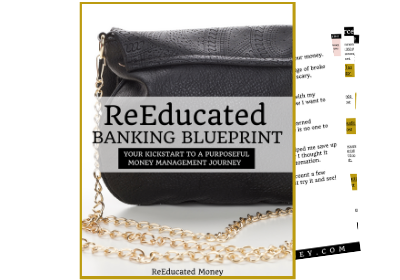How To Do A Money Audit
This Post May Contain Affiliate Links. Read The Disclaimer.
A money audit is an amazing motivator to get your financial life together.
Maybe you will find the main reason why your credit score is so low or that you actually do spend $200 a month on Starbucks. (No more guessing!)
Looking over your money might dig up a few skeletons and uncomfortable feelings about your use of money.
Don’t let it stop you.
When you look over something you have the power to change your story.
The little steps always count!
Plus, this time you have a game plan to follow once your overview is complete. You can get your money right and keep your money right with The ReEducated Money Plan.
Today, You will learn how to review all your money, evaluate what you see, and the next steps to take.
Here’s how to target your overview based on The ReEducated Money Journey Phases:
Shifting: Income, Expenses, Savings
Mastering: Savings, Credit, High-Interest Debt
Slaying: Debt and Retirement investing
Building: Net Worth and General Investing
Income
“Never depend on a single income. Make investments to create a second source” -Warren Buffett
Income is the money you bring in.
It can come from various places and the more places the better.
If your only source of money is from working, what happens when you lose the job? Or an unfortunate thing happens to you or you can’t work because a world pandemic happens? (ie our World 2020)
Working towards multiple income sources is key in reaching and sustaining financial independence.
You can earn money actively or passively.
Active income is where you are trading time for money such as full and part-time jobs, side hustles, freelancing, and anything service-based.
Passive income is when you earn money without using your time (it’s automated) such as dividends, investments, and digital products.
Some other ways to earn income blur those lines such as a business or rental income.
Action Steps:
- Write down all your sources of income every single month no matter how small
- Add them all together to see your full annual income.
Evaluation:
- Are you satisfied with the current amount of income you bring in and does it meet your monthly needs?
- Do you have any streams of income you want to add?
- What type of income would you like more of in the next year?
- What is keeping you from earning more income?
Next Steps:
- Think about ways to increase one of your current income sources
- Ask for a raise | Get Another Job | Work More Hours | Create more products
- Create a plan to start another income source ,keep it simple, and have a goal to have another one before the end of the year
- Side Hustles
- Dream Business
- Rental Property
Expenses
“Don’t tell me where your priorities are. Show me where you spend your money and I’ll tell you where they are” – James Frick
Your expenses are the hardest category to overview because you are coming face to face with your habits and money issues.
This is also the easiest one to look into because you have probably been in your online bank account at least once before.
We are going to go to the back end of your account and look for the words “Download Transactions” on both your debit and credit cards.
To find your transactions on your online bank account:
- Look under settings in your checking or credit card accounts
- Google “ Download transactions at [Your bank]”
- Try your banks Customer Service Chat
- Call customer service and ask them to send it to you
Make sure to download 2-3 months of transactions so you can get a good view of your spending habits.
Now place everything into the categories below:
- Bills (Internet, Cellphone, Utilities, Insurance)
- Food (Groceries, eating out, alcohol)
- Rent
- Entertainment (Events, vacation, subscriptions)
- Debt (Student loans, car payments, credit card)
- Household (Cleaning supplies and paper products)
- Car ( Gas, transportation, tolls)
- Personal Care (Hair, beauty, gym)
- Giving (Gifts, tithing, charity)
- Annual (memberships, Amazon, services)
- Misc (anything else)
Evaluation:
- How do you feel about what you see?
- Is the spending in some of those categories and subcategories shocking to you?
- Are there some categories you want to spend less on or maybe even more?
Next Steps:
- Make a plan to do something about areas that surprised you. Find a way to spend less by being more aware of your spending on a monthly basis.
- A great way to bring awareness to your spending is to do money envelopes or gift cards/digital cards for your problem areas. For example: if you are a Starbucks fanatic remove your credit card from the app, but buy a $20 gift card for the month. Once it’s gone don’t spend anymore until next month.
Savings
“Wealth like a tree grows from a tiny seed. The first copper you save is the seed from which your tree of wealth shall grow.”
The Richest Man in Babylon
Savings is income that you don’t spend or give away.
Because savings can also be investments, I am only referring to savings you keep in a high yield savings account.
Those two types of savings are: Emergency Funds and Sink Funds
An emergency fund is 3-6 months (Or MORE!) of savings for an emergency such as a job loss.
Sink funds are savings accounts for regular yearly expenses such as Christmas and birthdays and for saving up for bigger expenses such as a vacation or wedding.
Evaluation:
- Do you have a mini or fully stocked emergency fund?
- Do you think your emergency fund is ready for most of your possible emergencies?
- Do you have sink funds for your yearly needs?
- Do you have sink funds for big life expenses?
Next Steps:
- Stop all extra savings or debt payoff and build up a mini- emergency fund of 1 month of expenses. Work up to getting a fully stocked emergency fund once you have paid off all of your debt.
- Sink funds are essential in stopping surprise expenses and future knowns. Start thinking about saving for
- Christmas
- Gifts
- Car maintenance
- Vacations
Credit Report and Score
“ Nothing changes your life more, other than God and love, than moving your credit score 120 points” – John Hope Bryant
Your credit score is extremely important in your finances while building wealth.
If you are a millennial 9-5er like me having a good credit score can truly change the game for you.
Also, you don’t have to be in debt to have a good credit score; You have to have a history of borrowing money and paying it back on time with no late payments. So this could mean always putting big purchases on your credit card and paying it back over time or right away.
This also means making good financial decisions and not borrowing what you can’t pay back.
Let’s learn how to check your credit report and score:
You are entitled to one free Credit Report from every credit agency once a year.
AnnualCreditReport.com is government-backed and you can get your credit report as an immediate download.This gives you a full view of your credit history, but can be really confusing and long.
To make viewing your credit report a lot easier try Credit Karma or Credit Sesame.
Both of these are free and allow you to see your credit score and credit report in a condensed and easy to read format.
The loan, credit card, credit inquiries, and collections information is fully accurate.
Both sites are easy to sign up with and allow you to see exactly where you need to approve with actionable recommendations.
Action Steps:
- Go to Annualcreditreport.com to view your full report and download to your computer
- Look over the pages and get an understanding of where you stand with your credit
- Sign up for CreditKarma.com and/or CreditSesame.com
- Check your score, see how it’s broken down, and do their recommendations to make it better.
Evaluation:
- How do you feel about your credit score and everything on your report?
- What’s your goal number for your credit score?
- How has your credit score affected your life?
- What do you need to do to change it or improve it?
Next Steps:
- A score below 680 will create unnecessary stress when it comes to renting an apartment or buying houses, cars, and getting business loans. Aim for a score of 750 or above.
- Follow the recommendations by Credit Karma and Credit Sesame and check your score every month. It took a year for me to improve my credit dramatically. Consistency pays!
Debt
“The borrower is the slave to the lender” Proverbs 22:7
Let’s head to your debt accounts now.
Hopefully, this is not your first time here. Many people only see the big number when they first get their bill and never look at it again.
The more you look at it the more motivated you are to get it till it’s gone!
Here’s How:
- Log into your credit card and loan accounts and find the exact amount you owe, the minimum payment, and the interest for each debt you have.
- Be sure to write down every single loan. Student loans are shown lumped together, but each individual loan has its own interest rate.
- Add up all the debt up to give yourself one big number
Evaluation:
- How does that big number make you feel?
- How can you make better decisions in the future?
- How much of your debt was preventable?
- How much of your debt was worth it?
So many people have terrible feelings about their debt. I know I was embarrassed and ashamed of it for a very long time. Now, I see the opportunity to grow and learn it has brought me.It’s also the reason I’ve been so interested in personal finance and helping others.
Debt is also an amazing motivator to change your money journey.
Next Steps:
- Place the big number in a place you can see daily
- Ask yourself how much more a month you can put towards debt on top of the minimum payment. Even an extra $5 can make a huge difference.
- If you can’t put more to it, can you split the payment? Try paying it twice a month and you will save on interest and
- Recalculate your debt payoff date(s) and mark it in your calendar.
Investment Accounts
“How many millionaires do you know who have become wealthy by investing in savings accounts? I rest my case.” – Robert G. Allen
Investment accounts hold your investments in stocks, bonds, and mutual funds. When you invest you place money into investment and hope for a return on that investment that is much higher than any savings account can give you.
You can have several different investment accounts or keep them all under one account.
Types of Investment Accounts:
- Retirement Accounts: Offer Tax-benefits, but have restrictions
- Roth or Traditional IRA (If your employee does not provide a 401k with a match or You are self employed)
- Roth or Traditional 401k (Employee Sponsored or Matched)
- Many people forget to move their 401k’s when they move jobs, be sure to check on your old accounts for forgotten cash
- General Investment Accounts: A great place to invest extra money after retirement accounts are maxed out with no restrictions and can be invested in different ways:
- RoboAdvisors (A company does the work for you for a small fee)
- Financial advisors ( A person does the work for you for a % of your portfolio)
- Self Advised (You do the work and just pay the regular investment fees)
Check the amount and rate of return for all of your accounts and look over the evaluations below.
Evaluation:
- Do you feel you are getting the best rate of return for all your money? If not talk to an advisor or look into switching things to a new account
- Is your current debt interest lower than 6%? – Look into investing 2% or more of your money into retirement savings. If not keep putting all extra money towards debt until the only debt you have is below 6% interest.
Next Steps:
- If you are a new investor, focus on company-matched 401k’s or Roth IRA’s if there is no match, and then focus on general investing if you max those out for the year.
- If you want to be hands-off with investing stick to a robo advisor ( the link gives you 90 days of fee free investments) or financial advisor that you trust with low fees and high returns.
- The more money you put towards your retirement and general investing accounts the closer you are to financial independence, try to increase it by 5-10% (or more) each year.
Net Worth
Focus on all four of your net worth factors: increasing your income, increasing your savings, increasing your investment returns, and decreasing your cost of living by simplifying your lifestyle. – Harv Eker
Your net worth Is your assets minus your liabilities.
Your assets are what you own or increase your income. Examples are investments and property.
Your liabilities are what you owe or reduce your income. Examples are your monthly expenses and consumer loans.
Your net worth should be assessed often, especially as you gain or lose assets or liabilities.
- Keep a running spreadsheet in Google Docs or Excel of your assets minus liabilities so you are always aware of your net worth
Or
- Set up a free account in Personal Capital and get automatic updates of your net worth.
Evaluation:
- What net worth would make you feel secure in your finances?
- How many years will it take for your net worth to be positive?
- What are you willing to sacrifice to build a positive net worth and secure money future?
Next Steps:
- Set a big money goal and break it down into years and months to get your net worth to positive (Besides a mortgage) in 5 years or less.
- If your net worth is positive keep building it with powerful assets such as real estate, investments, and business
My Last Two Cents
This review radically changed my perspective of money. I had no idea there were so many factors at play and it made me hungry to know more about my money.
Use this knowledge to build your money future.
If you are ready to start your money journey with a guide who is a few steps ahead of you: Start Your Money Journey
-ReEducated Rizzy <3




